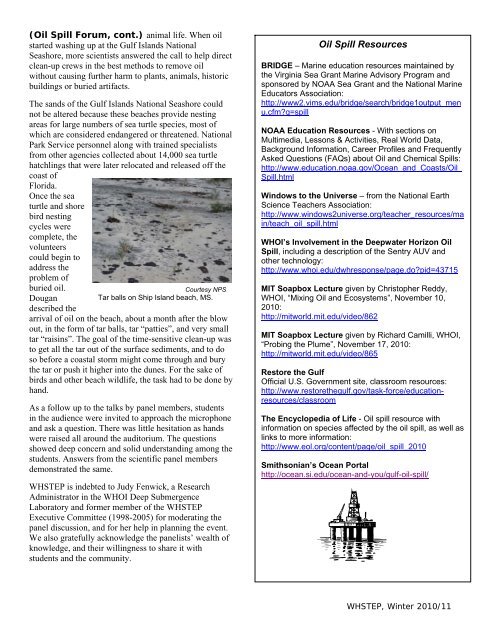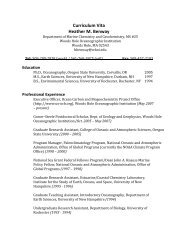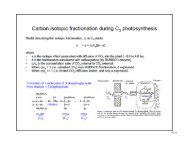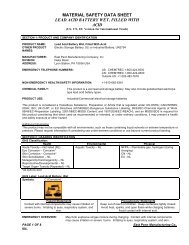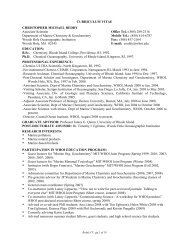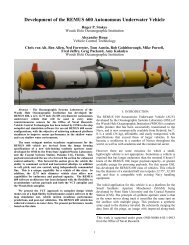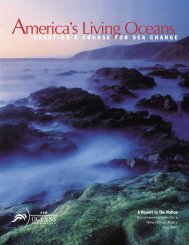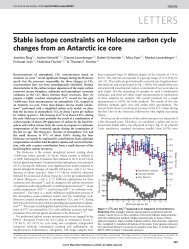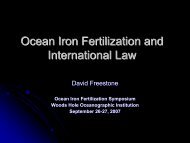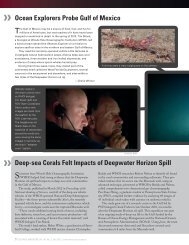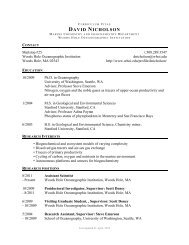Partnership - Woods Hole Oceanographic Institution
Partnership - Woods Hole Oceanographic Institution
Partnership - Woods Hole Oceanographic Institution
Create successful ePaper yourself
Turn your PDF publications into a flip-book with our unique Google optimized e-Paper software.
(Oil Spill Forum, cont.) animal life. When oil<br />
started washing up at the Gulf Islands National<br />
Seashore, more scientists answered the call to help direct<br />
clean-up crews in the best methods to remove oil<br />
without causing further harm to plants, animals, historic<br />
buildings or buried artifacts.<br />
The sands of the Gulf Islands National Seashore could<br />
not be altered because these beaches provide nesting<br />
areas for large numbers of sea turtle species, most of<br />
which are considered endangered or threatened. National<br />
Park Service personnel along with trained specialists<br />
from other agencies collected about 14,000 sea turtle<br />
hatchlings that were later relocated and released off the<br />
coast of<br />
Florida.<br />
Once the sea<br />
turtle and shore<br />
bird nesting<br />
cycles were<br />
complete, the<br />
volunteers<br />
could begin to<br />
address the<br />
problem of<br />
buried oil.<br />
Dougan<br />
described the<br />
Courtesy NPS<br />
Tar balls on Ship Island beach, MS.<br />
arrival of oil on the beach, about a month after the blow<br />
out, in the form of tar balls, tar “patties”, and very small<br />
tar “raisins”. The goal of the time-sensitive clean-up was<br />
to get all the tar out of the surface sediments, and to do<br />
so before a coastal storm might come through and bury<br />
the tar or push it higher into the dunes. For the sake of<br />
birds and other beach wildlife, the task had to be done by<br />
hand.<br />
As a follow up to the talks by panel members, students<br />
in the audience were invited to approach the microphone<br />
and ask a question. There was little hesitation as hands<br />
were raised all around the auditorium. The questions<br />
showed deep concern and solid understanding among the<br />
students. Answers from the scientific panel members<br />
demonstrated the same.<br />
WHSTEP is indebted to Judy Fenwick, a Research<br />
Administrator in the WHOI Deep Submergence<br />
Laboratory and former member of the WHSTEP<br />
Executive Committee (1998-2005) for moderating the<br />
panel discussion, and for her help in planning the event.<br />
We also gratefully acknowledge the panelists’ wealth of<br />
knowledge, and their willingness to share it with<br />
students and the community.<br />
Oil Spill Resources<br />
BRIDGE – Marine education resources maintained by<br />
the Virginia Sea Grant Marine Advisory Program and<br />
sponsored by NOAA Sea Grant and the National Marine<br />
Educators Association:<br />
http://www2.vims.edu/bridge/search/bridge1output_men<br />
u.cfm?q=spill<br />
NOAA Education Resources - With sections on<br />
Multimedia, Lessons & Activities, Real World Data,<br />
Background Information, Career Profiles and Frequently<br />
Asked Questions (FAQs) about Oil and Chemical Spills:<br />
http://www.education.noaa.gov/Ocean_and_Coasts/Oil_<br />
Spill.html<br />
Windows to the Universe – from the National Earth<br />
Science Teachers Association:<br />
http://www.windows2universe.org/teacher_resources/ma<br />
in/teach_oil_spill.html<br />
WHOI’s Involvement in the Deepwater Horizon Oil<br />
Spill, including a description of the Sentry AUV and<br />
other technology:<br />
http://www.whoi.edu/dwhresponse/page.do?pid=43715<br />
MIT Soapbox Lecture given by Christopher Reddy,<br />
WHOI, “Mixing Oil and Ecosystems”, November 10,<br />
2010:<br />
http://mitworld.mit.edu/video/862<br />
MIT Soapbox Lecture given by Richard Camilli, WHOI,<br />
“Probing the Plume”, November 17, 2010:<br />
http://mitworld.mit.edu/video/865<br />
Restore the Gulf<br />
Official U.S. Government site, classroom resources:<br />
http://www.restorethegulf.gov/task-force/educationresources/classroom<br />
The Encyclopedia of Life - Oil spill resource with<br />
information on species affected by the oil spill, as well as<br />
links to more information:<br />
http://www.eol.org/content/page/oil_spill_2010<br />
Smithsonian’s Ocean Portal<br />
http://ocean.si.edu/ocean-and-you/gulf-oil-spill/<br />
WHSTEP, Winter 2010/11


